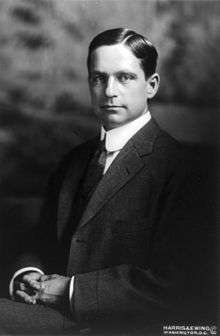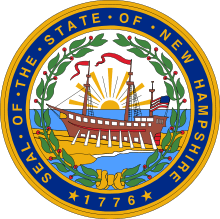Robert P. Bass
| Robert P. Bass | |
|---|---|
 | |
| 53rd Governor of New Hampshire | |
|
In office January 5, 1911 – January 2, 1913 | |
| Preceded by | Henry B. Quinby |
| Succeeded by | Samuel D. Felker |
| Member of the New Hampshire Senate | |
|
In office 1910 | |
| Member of the New Hampshire House of Representatives | |
|
In office 1905 1909 | |
| Personal details | |
| Born |
September 1, 1873 Chicago, Illinois |
| Died |
July 29, 1960 (aged 86) Peterborough, New Hampshire |
| Political party | Republican |
| Spouse(s) | Edith Harland Bird |
Robert Perkins Bass (September 1, 1873 – July 29, 1960) was an American farmer, forestry expert, and Republican politician from Peterborough, New Hampshire. He served in both houses of the New Hampshire Legislature and as chairman of the state's Forestry Commission before being elected governor of New Hampshire in 1910. He started one of the state's political dynasties: both his son, Perkins Bass, and grandson, Charles F. Bass, were elected to the U.S. House of Representatives. His daughter, Joanne, was the first wife of Marshall Field IV; heir to the Marshall Field's fortune & publishing mogul.
Life and career
The son of Perkins Bass and Clara (Foster) Bass, Robert P. Bass was born in Chicago, Illinois, although his family moved to Peterborough when he was nine. He grew up on a family farm that is still owned by descendants. He graduated from Harvard College in 1896. Bass was elected to the state House of Representatives in 1905 and 1909, and the state Senate in 1910. He was governor from 1911 to 1913.
His status was hurt however after the 1912 presidential election, when he supported Theodore Roosevelt's Progressive Party (Bull Moose Party) against the Republican nominee, President William Howard Taft. The move threw the state Republicans into disarray and led to a Democratic governor and a Democratic legislature. In retaliation, the party rejected Bass when he sought a U.S. Senate seat in 1913 and 1926.
Bass is remembered today for his stint as chairman of the New Hampshire Forestry Commission, when popular concern with forests' well-being was intense due to extreme over-logging in the White Mountains, and for sponsoring the legislation that led to the first direct primary law east of the Mississippi River.
In 1945, Bass, along with retired Supreme Court Associate Justice Owen J. Roberts, convened the assembly that produced the Dublin Declaration, which proposed the transformation of the United Nations General Assembly into a world legislature with "limited but definite and adequate power for the prevention of war."[1]
References
External links
| Wikimedia Commons has media related to Robert P. Bass. |
| Political offices | ||
|---|---|---|
| Preceded by Henry B. Quinby |
Governor of New Hampshire 1911–1913 |
Succeeded by Samuel D. Felker |
